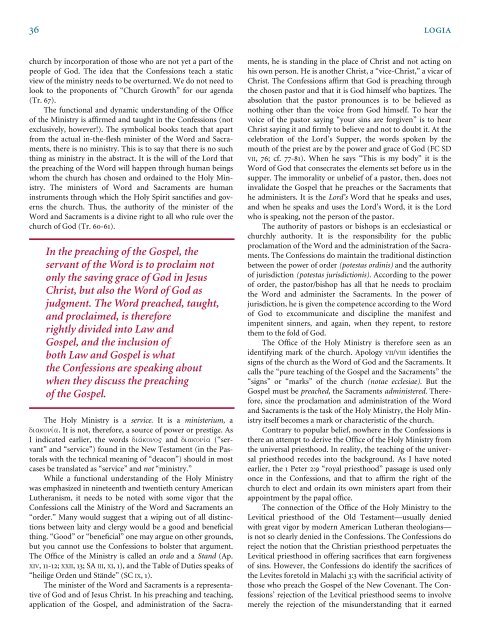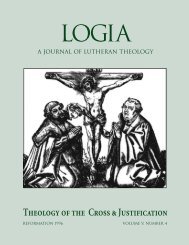Create successful ePaper yourself
Turn your PDF publications into a flip-book with our unique Google optimized e-Paper software.
36 logia<br />
church by incorporation of those who are not yet a part of the<br />
people of God. <strong>The</strong> idea that the Confessions teach a static<br />
view of the ministry needs to be overturned. We do not need to<br />
look to the proponents of “Church Growth” for our agenda<br />
(Tr. 67).<br />
<strong>The</strong> functional and dynamic understanding of the Office<br />
of the <strong>Ministry</strong> is affirmed and taught in the Confessions (not<br />
exclusively, however!). <strong>The</strong> symbolical books teach that apart<br />
from the actual in-the-flesh minister of the Word and Sacraments,<br />
there is no ministry. This is to say that there is no such<br />
thing as ministry in the abstract. It is the will of the Lord that<br />
the preaching of the Word will happen through human beings<br />
whom the church has chosen and ordained to the <strong>Holy</strong> <strong>Ministry</strong>.<br />
<strong>The</strong> ministers of Word and Sacraments are human<br />
instruments through which the <strong>Holy</strong> Spirit sanctifies and governs<br />
the church. Thus, the authority of the minister of the<br />
Word and Sacraments is a divine right to all who rule over the<br />
church of God (Tr. 60-61).<br />
In the preaching of the Gospel, the<br />
servant of the Word is to proclaim not<br />
only the saving grace of God in Jesus<br />
Christ, but also the Word of God as<br />
judgment. <strong>The</strong> Word preached, taught,<br />
and proclaimed, is therefore<br />
rightly divided into Law and<br />
Gospel, and the inclusion of<br />
both Law and Gospel is what<br />
the Confessions are speaking about<br />
when they discuss the preaching<br />
of the Gospel.<br />
<strong>The</strong> <strong>Holy</strong> <strong>Ministry</strong> is a service. It is a ministerium, a<br />
diakoniva. It is not, therefore, a source of power or prestige. As<br />
I indicated earlier, the words diavkono" and diakoniva (“servant”<br />
and “service”) found in the New Testament (in the Pastorals<br />
with the technical meaning of “deacon”) should in most<br />
cases be translated as “service” and not “ministry.”<br />
While a functional understanding of the <strong>Holy</strong> <strong>Ministry</strong><br />
was emphasized in nineteenth and twentieth century American<br />
Lutheranism, it needs to be noted with some vigor that the<br />
Confessions call the <strong>Ministry</strong> of the Word and Sacraments an<br />
“order.” Many would suggest that a wiping out of all distinctions<br />
between laity and clergy would be a good and beneficial<br />
thing. “Good” or “beneficial” one may argue on other grounds,<br />
but you cannot use the Confessions to bolster that argument.<br />
<strong>The</strong> Office of the <strong>Ministry</strong> is called an ordo and a Stand (Ap.<br />
XIV, 11-12; XXII, 13; SA III, XI, 1), and the Table of Duties speaks of<br />
“heilige Orden und Stände” (SC IX, 1).<br />
<strong>The</strong> minister of the Word and Sacraments is a representative<br />
of God and of Jesus Christ. In his preaching and teaching,<br />
application of the Gospel, and administration of the Sacra-<br />
ments, he is standing in the place of Christ and not acting on<br />
his own person. He is another Christ, a “vice-Christ,” a vicar of<br />
Christ. <strong>The</strong> Confessions affirm that God is preaching through<br />
the chosen pastor and that it is God himself who baptizes. <strong>The</strong><br />
absolution that the pastor pronounces is to be believed as<br />
nothing other than the voice from God himself. To hear the<br />
voice of the pastor saying “your sins are forgiven” is to hear<br />
Christ saying it and firmly to believe and not to doubt it. At the<br />
celebration of the Lord’s Supper, the words spoken by the<br />
mouth of the priest are by the power and grace of God (FC SD<br />
VII, 76; cf. 77-81). When he says “This is my body” it is the<br />
Word of God that consecrates the elements set before us in the<br />
supper. <strong>The</strong> immorality or unbelief of a pastor, then, does not<br />
invalidate the Gospel that he preaches or the Sacraments that<br />
he administers. It is the Lord’s Word that he speaks and uses,<br />
and when he speaks and uses the Lord’s Word, it is the Lord<br />
who is speaking, not the person of the pastor.<br />
<strong>The</strong> authority of pastors or bishops is an ecclesiastical or<br />
churchly authority. It is the responsibility for the public<br />
proclamation of the Word and the administration of the Sacraments.<br />
<strong>The</strong> Confessions do maintain the traditional distinction<br />
between the power of order (potestas ordinis) and the authority<br />
of jurisdiction (potestas jurisdictionis). According to the power<br />
of order, the pastor/bishop has all that he needs to proclaim<br />
the Word and administer the Sacraments. In the power of<br />
jurisdiction, he is given the competence according to the Word<br />
of God to excommunicate and discipline the manifest and<br />
impenitent sinners, and again, when they repent, to restore<br />
them to the fold of God.<br />
<strong>The</strong> Office of the <strong>Holy</strong> <strong>Ministry</strong> is therefore seen as an<br />
identifying mark of the church. Apology VII/VIII identifies the<br />
signs of the church as the Word of God and the Sacraments. It<br />
calls the “pure teaching of the Gospel and the Sacraments” the<br />
“signs” or “marks” of the church (notae ecclesiae). But the<br />
Gospel must be preached, the Sacraments administered. <strong>The</strong>refore,<br />
since the proclamation and administration of the Word<br />
and Sacraments is the task of the <strong>Holy</strong> <strong>Ministry</strong>, the <strong>Holy</strong> <strong>Ministry</strong><br />
itself becomes a mark or characteristic of the church.<br />
Contrary to popular belief, nowhere in the Confessions is<br />
there an attempt to derive the Office of the <strong>Holy</strong> <strong>Ministry</strong> from<br />
the universal priesthood. In reality, the teaching of the universal<br />
priesthood recedes into the background. As I have noted<br />
earlier, the 1 Peter 2:9 “royal priesthood” passage is used only<br />
once in the Confessions, and that to affirm the right of the<br />
church to elect and ordain its own ministers apart from their<br />
appointment by the papal office.<br />
<strong>The</strong> connection of the Office of the <strong>Holy</strong> <strong>Ministry</strong> to the<br />
Levitical priesthood of the Old Testament—usually denied<br />
with great vigor by modern American Lutheran theologians—<br />
is not so clearly denied in the Confessions. <strong>The</strong> Confessions do<br />
reject the notion that the Christian priesthood perpetuates the<br />
Levitical priesthood in offering sacrifices that earn forgiveness<br />
of sins. However, the Confessions do identify the sacrifices of<br />
the Levites foretold in Malachi 3:3 with the sacrificial activity of<br />
those who preach the Gospel of the New Covenant. <strong>The</strong> Confessions’<br />
rejection of the Levitical priesthood seems to involve<br />
merely the rejection of the misunderstanding that it earned

















